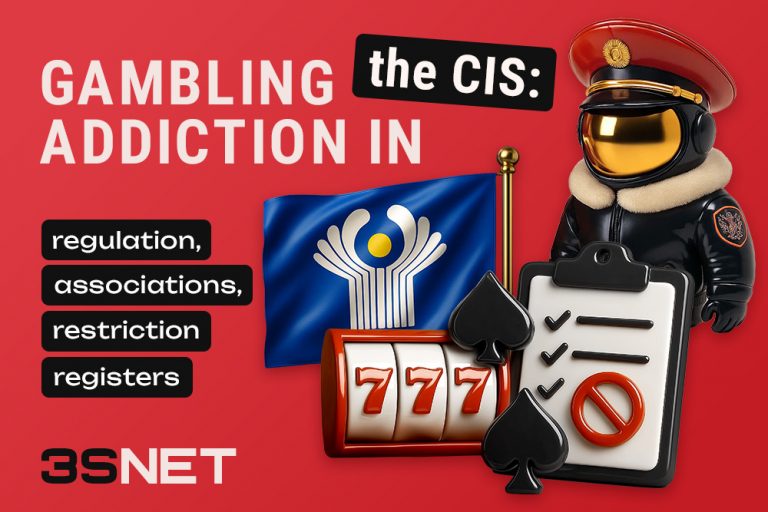
Publication date: 31 October 2025
Why has the problem of gambling addiction become important in 2025? In all CIS* countries, there is a common set of risks among gambling and betting audiences: increased popularity of games of chance and online betting, accessibility of illegal casino websites and bookmakers, vulnerability of young people and individuals with coexisting addictions, low awareness about self-restriction mechanisms, and lack of specialized assistance.
The CIS (Commonwealth of Independent States) is an international organization (interstate association) established to promote cooperation between countries that were formerly part of the USSR. As of 2025, full-fledged members of the CIS are Azerbaijan, Armenia, Kazakhstan, Kyrgyzstan, Russia, Tajikistan, Belarus, and Uzbekistan.
What Measures Do Different Countries Take to Combat Gambling Addiction?
Regulators in various countries are attempting to solve the problem of gambling addiction through different methods and their combinations: bans or restrictions on gambling, “white” (legal) gambling zones, oversight of online operators, as well as the launch of self-exclusion registries or lists of persons with limited access. On 3S.INFO, we will learn more about the most widespread measure: the creation of self-exclusion registries.
What is a Self-exclusion Register for Combating Gambling Addiction?
A self-exclusion registry is a centralized database of players who have voluntarily declared their wish to restrict their access to gambling activities for a certain period of time.
Key Functions of Gambling and Betting Self-Exclusion Registers
- Blocking access to online and offline casinos, bookies, lotteries;
- Mandatory verification by all licensed operators;
Protecting vulnerable players from relapses and impulsive behavior; - A tool for preventing ludomania at the state level.
Historical Overview: From Early Initiatives to Modern Systems for Combatting Gambling Addiction
| Stage | Examples | Content |
| 1960s–1980s | UK, Canada | The first local self-exclusion lists are maintained directly within casinos and bookmakers. Players filled out paper applications, which led to entry denial. |
| 1990s | USA, Australia | Regional programs emerge: lists cover entire states (for example, Nevada or Ontario). |
| 2000s | UK (2002), Sweden, Italy | Digitalization begins: registers are kept electronically but remain fragmented across different operators. |
| 2010s | UK — GAMSTOP (2018), Sweden — Spelpaus (2019) | National online registries are launched, covering all licensed operators and functioning automatically. Players can block access for 6 months, 1 year, or indefinitely. |
| 2020s | Kazakhstan (2021–2022), Belarus (2022), Russia and Uzbekistan (2024–2025) | CIS countries begin implementing national self-exclusion systems integrated with government services and identification systems. The registry becomes part of comprehensive responsible gaming policies. |
Self-Exclusion Registers in CIS Countries: Second Generation (2020–2025)
- Belarus was one of the first CIS countries to implement a centralized register of restricted individuals mandatory for all operators to check (2022).
- Kazakhstan introduced a digital self-limitation mechanism via the eGov portal since 2021, extending periods up to 10 years in 2024.
- Russia is launching a unified self-exclusion register in 2025 via the Gosuslugi (“State Services”) portal the public-law company ERAI.
- Uzbekistan creates the EGRSI system (2025), unifying bet registration, player data, and restriction records into a single digital platform.
These systems feature unique characteristics distinct from early paper-based lists:
- They operate automatically and interconnect all operators;
- Integrated with government services and KYC identity verification processes;
- Include both voluntary self-exclusion and compulsory limitations imposed by courts, authorities, or family members.
Features of Self-Exclusion Registers Across CIS Countries
All CIS countries are in the process of improving their systems by adopting best international practices, although the pace and effectiveness of this development vary.
Why Are Effective Self-Exclusion Registers Important Today?
Effective self-exclusion registers are not just a technical tool, but an essential element of social responsibility and citizen protection in the digital age. Their importance today stems from several critical factors.
- Psychological aspect — the register gives a person time for rehabilitation, reducing the risk of impulsive relapse.
- Legal aspect — operators are obligated to verify clients and bear responsibility for violations.
- Social aspect — the state acquires a tool for monitoring and collecting statistics on dependency.
Structure of the Best Self-Exclusion Registers: International Experience
The structure of the best self-exclusion registers represents a complex system combining rigorous technology, thoughtful legislation, and user convenience. These systems work on the principle of “set once — banned everywhere.” Here is how the most effective ones function, drawing examples from leading practices: UK, Sweden, Italy, Singapore.
How Does International Experience in Combating Gambling Addiction Impact the CIS Region?
International experience demonstrates that self-exclusion registers are effective only when combined with mandatory cross-operator verification, integration with national ID systems, and psychosocial support services. This comprehensive approach is what CIS countries are currently moving towards, building their own systems based on proven foreign models.
Systems like GAMSTOP and Spelpaus have become benchmarks. Their principles are now being adopted in Russia, Kazakhstan, and Uzbekistan:
- Centralized database with mandatory verification by all licensed operators;
- Impossibility to instantly withdraw one’s declaration;
- Integration with government services and digital identity cards.
The Belarusian model resembles the Italian one — strict control and a centralized list, though without extended terms or family restrictions yet. Meanwhile, Kazakhstan added an innovation — a 10-year limit, exceeding even many European systems.
Combating Gambling Addiction: What Else Works and What is Often Lacking?
- Prevention Funding. The Russian model through ERAI accumulates targeted funds (including for sports), but stable funding for independent prevention/treatment efforts is scarce.
- Independent NGOs and Helplines. Most CIS countries lack specialized NGOs addressing gambling addiction. In their absence, registers become merely a “technical barrier” rather than part of comprehensive support.
- The main challenge is offshore online and cross-border access. Without international cooperation and payment restrictions, the grey market has a huge influence on at-risk players.
Effective self-exclusion registers are vital today because they serve as practical, working tools for self-protection for vulnerable citizens in an environment where potentially harmful services have become highly accessible. They combine individual responsibility, technological solutions, and state regulation to mitigate severe social and economic consequences of addiction. While not a panacea, they represent a critically important component in the overall system of aid and protection.
FAQ
Why Has Gambling Addiction Become Relevant in 2025?
In CIS countries, there’s been an increase in the popularity of games of chance and online betting, availability of illegal websites, high youth vulnerability, and low awareness of self-restriction methods. This increases the risks of ludomania and necessitates comprehensive protective measures.
What Is a Self-Exclusion Register and How Does It Help Combat Gambling Addiction?
A self-exclusion register is a centralized database of players who voluntarily restrict their access to gambling activities. It blocks access to casinos and betting shops, helps operators verify customers, and reduces the risk of impulsive relapses.
What Features Characterize Self-Exclusion Registers in CIS Countries?
In the CIS, digital registers are being implemented, integrated with government services, linking all operators automatically, incorporating both voluntary and forced restrictions, and integrating with KYC and identification systems.
How Does International Experience Influence the Fight Against Gambling Addiction in the CIS?
Models such as those from the UK (GAMSTOP) and Sweden (Spelpaus) have become benchmarks for the CIS: centralized databases, mandatory checks by all operators, and inability to quickly withdraw declarations. This contributes to the creation of effective self-protection structures.
What Challenges Remain in Addressing Gambling Addiction in the CIS?
Main challenges include insufficient funding for prevention and treatment, lack of specialized NGOs, and the influence of offshore markets and illegal operators. Without international cooperation and a comprehensive approach, the problem remains significant.
Share it with your friends via favorite social media



























